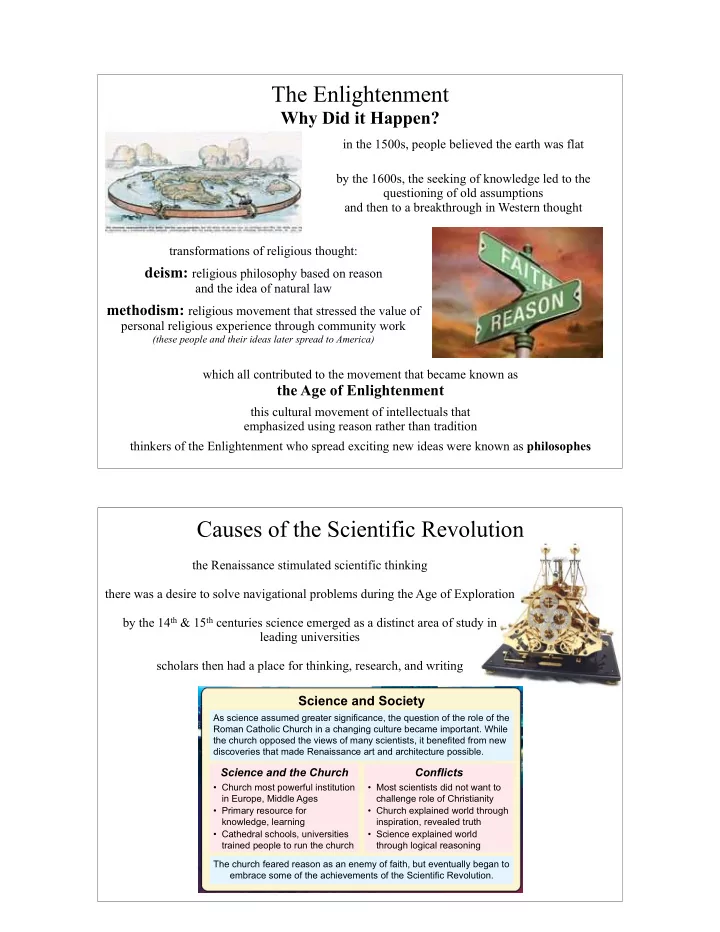

The Enlightenment Why Did it Happen? in the 1500s, people believed the earth was flat ! ! by the 1600s, the seeking of knowledge led to the questioning of old assumptions and then to a breakthrough in Western thought transformations of religious thought: ! deism: religious philosophy based on reason and the idea of natural law ! methodism: religious movement that stressed the value of personal religious experience through community work (these people and their ideas later spread to America) which all contributed to the movement that became known as the Age of Enlightenment ! this cultural movement of intellectuals that emphasized using reason rather than tradition ! thinkers of the Enlightenment who spread exciting new ideas were known as philosophes Causes of the Scientific Revolution the Renaissance stimulated scientific thinking ! there was a desire to solve navigational problems during the Age of Exploration ! by the 14 th & 15 th centuries science emerged as a distinct area of study in leading universities ! scholars then had a place for thinking, research, and writing Enlightenment and Revolution Science and Society As science assumed greater significance, the question of the role of the Roman Catholic Church in a changing culture became important. While the church opposed the views of many scientists, it benefited from new discoveries that made Renaissance art and architecture possible. Science and the Church Conflicts • Church most powerful institution • Most scientists did not want to in Europe, Middle Ages challenge role of Christianity • Primary resource for • Church explained world through knowledge, learning inspiration, revealed truth • Cathedral schools, universities • Science explained world trained people to run the church through logical reasoning The church feared reason as an enemy of faith, but eventually began to embrace some of the achievements of the Scientific Revolution.
The Scientific Revolution Nicholas Copernicus (1473-1543) started his scientific career in Poland in 1492 upheld the common belief of a round earth that rotated on its axis as it revolved around the sun kept his ideas secret = wouldn't be persecuted Tycho Brahe (1546 – 1601) found evidence in the late 1500s that supported Copernicus’ heliocentric theory set up an astronomical observatory carefully observed the sky every night for years accumulated data about the movement of the stars and planets Galileo Galilei (1564-1642) mathematician; telescope; discovered moons orbiting Jupiter: not all heavenly bodies revolve around the sun Johannes Kepler Catholic Church put him on trial; (1571-1630): forced to recant astronomer and mathematician; elliptical orbits The Scientific Revolution Francis Bacon (1561-1626) philosopher; scientific method Rene Descartes (1596-1650) French philosopher and mathematician - believed truth must be reached through reason Discourse on Method (1637): “I think, therefore I am.” What similarities existed between their ideas?
The Scientific Revolution Joseph Priestly (1733-1803) English chemist and clergyman discovered oxygen and studied the existence of carbon dioxide Antoine Lavoisier (1743-1794) French scientist who discovered the nature of combustion ! Marie Lavoisier, his wife, learned English and Latin so she could translate scientific essays and books for him she also drew the illustrations for his books William Harvey (1578-1657) English doctor who proved Robert Hooke that blood circulates through (1635-1703) the body via the heart and English scientist who veins used the newly invented microscope to find cells in vegetable tissue Andreas Vesalius (1514-1564): medical student; dissections Effects of the Scientific Revolution Challenges to Religion: the universe worked like a machine according to natural laws (without the intervention of God) ! Decline in Belief in Magic, Demons, and Witchcraft: educated classes denied the existence of demons and the power of witchcraft ! Questions about Humanity's Role in the Universe: the importance of humanity reduced: inhabitants of a tiny planet circling the sun ! Gave Humanity Control of Nature: through science and technology, they could improve human life ! Challenges to Established Views of Women: The new scientific ideas concluded that both men and women made equal contribution to reproduction
Recommend
More recommend